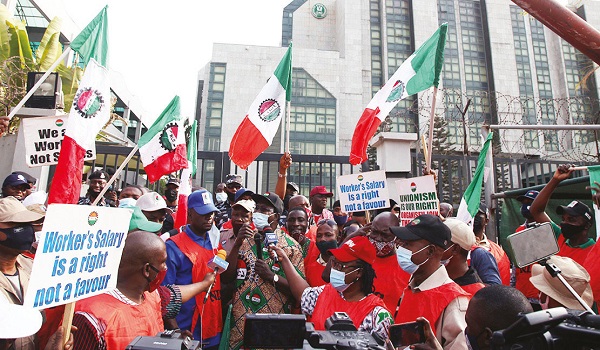The Nigeria Labour Congress (NLC) and other affiliate bodies have vowed to come down hard on states yet to implement the new minimum wage, saying such action would take place at the end of January.
The Federal Government designated this January as the starting date for state governments’ implementation of the minimum wage.
While most states have committed to paying the N70,000 minimum wage approved by President Bola Tinubu in 2024, not many have started making payments since the approval in July.
A top official of the Nigeria Labour Congress (NLC), who spoke on the condition of anonymity (as per Saturday Sun) said workers had expected payments to begin in December but now anticipate that payments will commence in many states by January.
He also said that by then, NLC would hold a National Executive Council (NEC) meeting to decide how best to tackle those states that had refused to implement the new wage.
“Workers have endured for too long without their rightful pay. We will not stand by while our members suffer. If by the end of January these states have not implemented the minimum wage, we will explore all available legal and industrial actions to ensure compliance,” said an NLC official.
As of December, four states including Zamfara, Imo, Akwa Ibom and Katsina had yet to implement the new minimum wage.
In his new year message NLC President, Joe Ajaero, had demanded that governments at all levels adhere to the new minimum wage beginning from this year.
NLC Spokesperson, Ben Upah had warned that any state refusing to implement the N70,000 minimum wage would be inviting trouble to its doors.
“The states have become very rich, as you can see, the FAAC allocation to them has moved up. So, we do not expect any state to act in breach of this law. And besides that, the cost of living has pushed up. The Naira has lost considerable value and anybody who says they cannot afford to pay will be causing trouble and trouble they will have,” he had said.
Also, the President of the Trade Union Congress (TUC), Festus Osifo, has threatened strike in states refusing to comply with the law.
Osifo noted that while some states have made progress, with up to 80 per cent of the necessary adjustment processes already in place, others remain significantly behind.
He specifically called out Zamfara and Cross River states for their lack of action, noting that workers in Cross River are already engaged in a two-day warning strike and that if the state government does not respond, the strike could escalate to an indefinite action.
Osifo stressed that the minimum wage issue goes beyond the simple announcement of wage figures such as N30,000, N80,000, or N90,000. The core issue, he explained, is the implementation of the necessary adjustments to align wages with the new national standard.
“There are some states where there is no conversation whatsoever about the implementation of the new minimum wage. We call on these states to come to the table and discuss how to implement the new national minimum wage, along with the consequential adjustments, so that workers can start benefiting,” he added.
